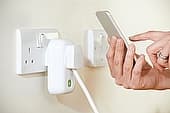Home > News > Pandemic narrowed UK digital divide, Ofcom say
Pandemic narrowed UK digital divide, Ofcom say
New research from Ofcom shows a reduction in the number of homes unable to access the internet.
It suggests 6% of households don't have access to the internet, although Ofcom warn this 5% drop may be partly related to data collection methodology changes.
77% of UK adults over the age of 65 used the internet at home, and they were the least likely to only go online via a smartphone.
Other findings in the Adults' Media Use and Attitudes report included the fact that 85% of internet users went online via smartphones and a majority of adults were gaming in 2020.

Digital divide
Ofcom say a minority of households still did not have any access to the internet in March 2021, pinpointing this figure at 6%. A further 1% of adults had access but chose not to use the internet.
A year earlier, in March 2020, 11% of households did not have access to the internet, suggesting a decrease of 5%.
However, Ofcom warn this downward trend should be seen as indicative only since Covid-19 prompted methodology changes to the research.
We've seen in the past that more representative samples of respondents come up with different results about internet usage, especially in relation to older people.
Even so, Ofcom's latest findings do correlate with other data such as the Britain under Lockdown report published in August 2020 which found 56% of people had learned to use some new form of technology due to the Covid-19 pandemic.
Older users
Overall, Ofcom found 77% of those over 65 use the internet at home, with 55% of them using a smartphone and only 2% of internet users solely using a smartphone to get online.
59% of internet users over 65 have a social media profile and their main profile is overwhelming a Facebook account - 83% of over 65s said Facebook was their main social media account compared to 19% of those aged 16 to 24.
Over 65s were more likely than other age groups to be aware than some websites will provide accurate and unbiased information while others will not.
58% could correctly identify advertising on Google, while only 39% were aware of all four surveyed ways in which companies can collect personal data online.
Read more about why older people should be getting online.
Other findings
The survey included numerous insights about the way UK households access the internet and what they use it for.
For example, it shows 10% of internet users only go online using a smartphone, and this was more likely in poorer socio-economic groups (18%) and among women (13%).
In fact, those in the DE socio-economic group were less like than average to:
- Play games on any device (50%)
- Correctly identify advertising on Google (53%)
- Be aware that some websites are inaccurate and unbiased (53%)
- Be aware of all four surveyed ways in which companies can collect personal data online (27%)
Other findings in the survey included:
- 62% of adults were playing games on a device in 2020 with 92% of 16-24s doing so
- Smartphones were the devices most likely to be used to get online (85% of respondents used them)
- The most popular activities undertaken online were communications (92%), email (91%) and accessing Government services (85%)
Ofcom also looked at the awareness internet users have about the ways companies can collect personal data online:
- 52% were aware of data being collected through smartphone apps
- 61% were aware of data being collected through registrations
- 64% were aware of data being collected through social media
- 77% were aware of cookies being used to collect information on websites
While 9 in 10 of respondents were aware of at least one of these methods of online data collection, only 4 in 10 were aware of all these methods.
Read our full guide on keeping personal details safe online.
Get insider tips and the latest offers in our newsletter

We are independent of all of the products and services we compare.

We order our comparison tables by price or feature and never by referral revenue.

We donate at least 5% of our profits to charity, and we have a climate positive workforce.
Latest Technology Guides

Technology
Echo Show 15: Hands-on review
Technology
Which is the best air purifier?
Technology
Kobo Elipsa reviewLatest Technology News

Technology
Right to repair rules come into force